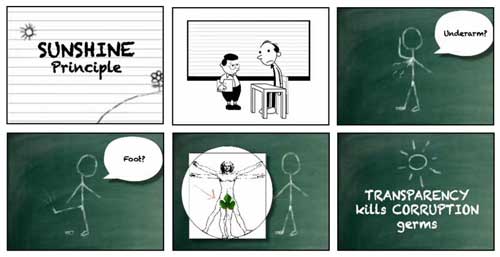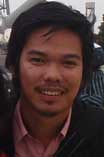








Generasi muda menganggap korupsi sebagai praktek normal
Brussels, Belgia - "Pak guru, saya pikir prinsip Sinar Matahari bisa dipakai untuk mencegah korupsi," kata seorang murid dalam kelas. Mentari ampuh membunuh kuman, ucapnya.
Ia lalu bertanya bagian mana dari tubuh yang paling banyak dipenuhi kuman. "Ketiak, kaki, dan, hehehe, alat kelamin, karena ketiganya jarang terkena sinar matahari. Matahari sama seperti transparansi, membunuh kuman korupsi," ujarnya menjawab pertanyaannya sendiri.
Murid yang merepet di depan kelas itu muncul dalam animasi singkat sepanjang satu menit, buatan Affiliated Network for Social Accountability in East Asia the Pacific Youth (ANSAP-EAP Youth).

"Bungkus yang bagus seperti kartun itu penting agar anak muda tertarik," ucap Marlon Cornelio, 25 tahun, aktivis ANSAP-EAP Youth asal Filipina, dalam Global Youth Anti-corruption Forum di Brussels, Belgia, Jumat (28/5) lalu.
"Bumbu humor perlu juga ditambahkan agar animasi tidak terasa berat," katanya sembari tersenyum, merujuk pada diselipkannya gurauan tentang alat kelamin dalam kartun pendek tersebut.
Animasi ini dipakai sebagai alat kampanye ANSAP-EAP Youth mempengaruhi generasi muda untuk melawan korupsi. Organisasi yang melibatkan aktivis di Filipina, Indonesia, Mongolia, dan Kamboja tersebut pun membuat situs web jejaring sosial semacam Facebook di www.ansa-eapyouth.ning.com untuk menarik lebih banyak anak muda.
Tak ada yang bisa menyangkal, melibatkan generasi muda dalam gerakan anti-korupsi sangat penting demi masa depan yang lebih bersih dan adil. "Anak muda adalah pemimpin di masa depan, kita harus berinvestasi menanamkan nilai-nilai anti-korupsi pada benak dan perilaku mereka," tutur Marlon.
 Masalahnya, umumnya generasi muda merasa isu anti-korupsi terlalu berat dan sulit dipahami. Tak jarang karena praktek korup merajalela dalam kehidupan sehari-hari, remaja merasa korupsi adalah hal yang biasa, sekadar bagian dari realitas hidup. Dalam Global Youth Anti-corruption Forum yang diadakan World Bank Institute di Brussels 26-28 Mei lalu, kedua tantangan itu selalu muncul dalam cerita 50 aktivis muda yang hadir.
Masalahnya, umumnya generasi muda merasa isu anti-korupsi terlalu berat dan sulit dipahami. Tak jarang karena praktek korup merajalela dalam kehidupan sehari-hari, remaja merasa korupsi adalah hal yang biasa, sekadar bagian dari realitas hidup. Dalam Global Youth Anti-corruption Forum yang diadakan World Bank Institute di Brussels 26-28 Mei lalu, kedua tantangan itu selalu muncul dalam cerita 50 aktivis muda yang hadir.
"Satu survei di Filipina menunjukkan lebih dari 70 persen anak muda tidak menyukai pemerintah maupun politisi, dan tidak ingin membicarakannya. Kalau membicarakannya saja tidak mau, bagaimana mereka bisa tertarik melawan korupsi," kata Marlon.
Hal serupa terjadi di Libanon. "Generasi muda kami menganggap korupsi sebagai praktek normal, dan mereka merasa tak berdaya mengubahnya," ujar Raghda Allouche, 24 tahun, Koordinator Proyek Lebanese Transparency Association (LTA).
Tentu, tutur Raghda, organisasinya tidak tinggal diam. "Anggapan itu tak bisa diterima. Generasi muda adalah masa depan, dan hanya dengan keterlibatan kitalah perubahan bisa terjadi," ucapnya.
Ia yakin jika anak muda dimobilisasi dan dilibatkan dalam gerakan anti-korupsi, maka masa depan yang lebih baik dapat terwujud. LTA melaksanakan beragam pelatihan dan lokakarya anti-korupsi untuk pemuda-pemudi. Topiknya beragam, mulai dari tata kelola yang baik (good governance), transparansi, akuntabilitas, akses terhadap informasi, hingga pemantauan anggaran pemilihan umum.
Melalui program Youth Civil Society Leaders, LTA pun mendorong generasi muda untuk merancang proyek anti-korupsi mereka sendiri. LTA mengucurkan dana bagi proyek yang terpilih.
Keakraban anak muda dengan teknologi bisa juga dijadikan jalan masuk untuk melibatkan mereka. Seperti yang dilakukan warga Kenya, Pauline Wanja Kamau, 25 tahun, Program Officer Kibera Community Development Agenda. "Kami meminta pemuda-pemudi Kenya melaporkan korupsi melalui pesan pendek," katanya.
Anak muda Kenya, terutama di ibukotanya, Nairobi, menyambut dibukanya jalur pesan pendek itu. Sekitar seratus pesan membanjiri nomor seluler Kibera tiap bulan. "Kebanyakan tentang korupsi di sekolah, dan satu pesan dengan lainnya biasanya saling terkait. Kami lalu turun ke sekolah yang dimaksud untuk menyelidiki kasus yang dilaporkan," tutur Pauline.
Sedangkan lembaga swadaya masyarakat Ocasa di Kolumbia dan Initiative Regional Youth di Bulgaria mengadakan kursus virtual via internet untuk melatih generasi muda memahami dan menjalankan gerakan anti-korupsi.
"Kuncinya, aktivitas untuk anak muda harus interaktif, dan keinginan masyarakat harus dipertimbangkan dalam perancangan kegiatan itu," kata Atanas Dimitrov dari Youth Educational Forum, Macedonia, 21 tahun, melalui telewicara video.
Masyarakat sipil perlu pula menyusun strategi yang solid namun fleksibel terhadap perubahan yang mungkin terjadi sewaktu-waktu. Dan sebagai agen perubahan, tentu aktivis harus memberi contoh terlebih dahulu dengan memasang standar yang tinggi dan mencapainya, ujar Atanas.
"Orang suka mendengarkan musik, dan pesannya bakal sampai langsung ke otak kita," kata musisi asal Kongo, Katya Vinywasiki Emmanuel, 26 tahun. Grup bandnya, yang dinamai Katya Emmanuel, kerap membuat lagu bertema kritik sosial.
"Hidup kami, keluarga kami, merana karena korupsi. Kami harus melawannya, dan cara yang kami pilih adalah melalui musik," ucapnya. Band lintas negara itu -- anggotanya berasal dari Kongo dan Kenya -- meramu musik reggae dan hip hop untuk menjangkau anak muda.
Musik juga menjadi pilihan band reggae-rock asal Malawi, Mafilika, dan grup hip-hop Arab yang dibentuk pengungsi Palestina di Libanon, I-Voice, untuk mengajak generasi muda melawan korupsi.
Katya Emmanuel, Mafilika, dan I-Voice datang ke Brussels sebagai pemenang kompetisi musik Youth Fair Play yang diselenggarakan World Bank Institute dan Jeunesses Musicales International. Ketiganya lantas berkolaborasi menyusun satu lagu berjudul "Together Against Corruption" (Bersama Melawan Korupsi), yang dibawakan pula dalam pentas di Brussels Jazz Marathon akir pekan lalu.
Apa yang mereka lakukan mengingatkan Tempo akan langkah Slank di Indonesia, yang begitu gencar mendukung kegiatan anti-korupsi.
Peran media massa tentu tak bisa pula dilepaskan dari upaya melibatkan anak muda terjun melawan korupsi. Hanya saja, media massa arus utama (mainstream) lazimnya memuat berita korupsi yang "kering", kurang menarik generasi muda.
 Marcelo Soares, 33 tahun, membuktikan berita korupsi bisa dibuat lebih ringan, "nakal", namun sekaligus memicu anak muda bergerak. Jurnalis kawakan asal Brasil itu merancang program politik untuk MTV Brasil. Seminggu sekali, ia menyajikan berita politik dengan sudut berbeda, mudah dicerna, dengan grafis yang sangat pop namun informatif.
Marcelo Soares, 33 tahun, membuktikan berita korupsi bisa dibuat lebih ringan, "nakal", namun sekaligus memicu anak muda bergerak. Jurnalis kawakan asal Brasil itu merancang program politik untuk MTV Brasil. Seminggu sekali, ia menyajikan berita politik dengan sudut berbeda, mudah dicerna, dengan grafis yang sangat pop namun informatif.
"Dan tahun ini untuk pertama kalinya, MTV Brasil akan membuat liputan khusus tentang pemilihan umum," ujarnya dengan nada bangga. Di Brasil dan di seluruh dunia, televisi adalah medium yang menjangkau paling banyak khalayak, termasuk generasi muda, termasuk pula orang-orang yang tak fasih membaca.
Dengan blog dan akun Twitternya, Marcelo aktif juga di dunia maya. Blog E Voce Com Isso? (Apa Yang Akan Kau Lakukan?) dan Twitter Marcelo (yang diikuti alias di-"follow" oleh hampir dua ribu orang) terhubung dengan situs web MTV. Interaksi dan diskusi dengan anak muda mengenai politik, transparansi, akuntabilitas, dan korupsi, terjadi di ruang-ruang bikinan Marcelo itu.
Waktu tiga hari rasanya jauh dari cukup untuk bertukar ide dan merancang solusi atas permasalahan 50 aktivis muda itu. Tapi di hari ketiga Forum, semua peserta sepakat perjuangan tak berakhir di Brussels. "Perjuangan kita bersama-sama baru dimulai. Orang sekarang mungkin merasa kalau tidak korup, mereka tidak akan kebagian jatah. Tapi pemuda bisa mendobrak lingkaran setan itu," ucap Gina Romero, 30 tahun, Direktur Ocasa, dengan yakin.
Selain Tempo,memang tak ada perwakilan Indonesia lainnya dalam Forum di Brussels. Tapi kita tak perlu berkecil hati, anak muda Indonesia tak ketinggalan dalam gerakan anti-korupsi. Tempo tahu ada Retha Dungga, 29 tahun, dari Transparency International Indonesia, yang kini sedang sibuk merancang program anti-korupsi untuk pelajar Sekolah Menengah Atas. Ada juga Dermawan Bakri, 19 tahun, dan kawan-kawannya, yang sukses membongkar korupsi di sekolah mereka, SMA Negeri 3 Surakarta, pada tahun 2008 lalu.
Komisi Pemberantasan Korupsi pun memiliki program yang menyasar anak muda di beragam propinsi. Adapun lembaga swadaya masyarakat anti-korupsi di Indonesia seperti Indonesia Corruption Watch, Koalisi Antikorupsi Pendidikan, dan Indonesia Budget Centre, juga dipenuhi anak muda bersemangat yang menggerakkan negara ini menuju masa depan lebih cerah.
Bunga Manggiasih
Anak Muda
Perserikatan Bangsa-bangsa mendefinisikan anak muda sebagai individu berumur 15-24 tahun. Remaja dan dewasa muda masuk di dalamnya. Pada 2005, jumlah pemuda-pemudi di seluruh dunia tercatat 1,02 miliar orang alias 15,8 persen dari populasi dunia yang berjumlah 6,47 miliar orang. Jumlah anak muda pada tahun 2025 diperkirakan melonjak menjadi 1,22 miliar.
(sumber: situs web Perserikatan Bangsa-bangsa)
Global Youth Anti-corruption Forum
Diadakan oleh World Bank Institute untuk menghubungkan aktivis muda dari penjuru dunia dalam upaya mewujudkan dunia yang lebih bersih. “Untuk memberi dampak yang kuat, kita perlu berkoalisi. Forum ini memberi kesempatan mereka membangun jaringan, serta berbagi pengetahuan dan pengalaman,” ujar Boris Weber, Team Leader Youth Program World Bank Institute.
credits:
video "Sunshine Principle" : screen captured from http://voices-against-corruption.ning.com/
pictures of Marlon, Marcelo, and Gina: me
pictures of Raghda, Pauline, Boris, and Fairplay poster: from http://voices-against-corruption.ning.com/ (Raghda's taken by Brook duBois, Pauline's by Marlon Cornelio, Boris's from his profile page, Fairplay poster made by JMI)
English translation will be available soon -- in the mean time, feel free to use Google Translate ;)